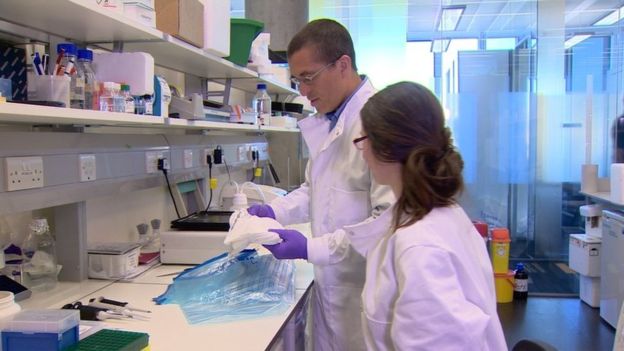
Isaac Asimov is often credited with the following quote, and while I’ve never been able to confirm that he really did say or write this, it still does resonate with many …
“The most exciting phrase to hear in science, the one that heralds new discoveries, is not “Eureka!” (I found it!) but “That’s funny …”
… and so we have had an actual example of this pop up on the BBC.
Our story today concerns Joy Milne, a lady from Perth in Scotland, who was able to smell her husband’s Parkinson’s disease long before it was officially diagnosed. Due to her highly sensitive ability of smell she noticed something odd and explains it as follows …
“His smell changed and it seemed difficult to describe. It wasn’t all of a sudden. It was very subtle – a musky smell.”
Since he was a consultant anaesthetist she initially assumed it was in some way related to his work environment. It was only later that the penny dropped; after he had been formally diagnosed with Parkinson’s and she started coming into contact with others who also had Parkinson’s at the charity Parkinson’s UK, she realised that they had the exact same musky smell. She realised the significance of this, and so she approached some scientists after a talk. They thought not only “that’s odd”, but decided to test it and see.
As explained on the BBC site, here is what happened …
Dr Tilo Kunath, a Parkinson’s UK fellow at the school of biological sciences at Edinburgh University, was one of the first scientists Joy spoke to.
He says: “The first time we tested Joy we recruited six people with Parkinson’s and six without.
“We had them wear a t-shirt for a day then retrieved the t-shirts, bagged them and coded them.
“Her job was to tell us who had Parkinson’s and who didn’t.
“Her accuracy was 11 out of 12. We were quite impressed.”
Dr Kunath adds: “She got the six Parkinson’s but then she was adamant one of the ‘control’ subjects had Parkinson’s.
“But he was in our control group so he didn’t have Parkinson’s.
“According to him and according to us as well he didn’t have Parkinson’s.
“But eight months later he informed me that he had been diagnosed with Parkinson’s.
“So Joy wasn’t correct for 11 out of 12, she was actually 12 out of 12 correct at that time.
“That really impressed us and we had to dig further into this phenomenon.”
And that is exactly what they are doing.
Why is this significant?
Parkinson’s disease is quite frankly a terrible disease that manifests as shaking, rigidity, slowness of movement and difficulty with walking and gait. Later, thinking and behavioral problems may arise, with dementia commonly occurring in the advanced stages of the disease.
- About 103,000 people die each year from this
- We simply do not know what causes it.
Discovering that there is a smell that is specifically related to Parkinson’s means that those researching it can now explore what is causing it. Understanding that could lead to a quick simple test and far earlier diagnosis – right now it is very challenging to diagnose, all they do is observe the symptoms and that is no different to what Dr Parkinson was doing back in 1817 when he first described it.
“A diagnostic test like this could cut through so much of that, enable people to go in and see a consultant, have a simple swab test and come out with a clear diagnosis of Parkinson’s.
“It would be absolutely incredible and life-changing for them immediately.”
Ms Crawford adds: “They and their professional colleagues would be able to discuss and arrange a treatment programme, be able to monitor the progression of the disease and treat it appropriately as it went on and it would potentially offer more opportunities for people living with Parkinson’s to get involved in research.”
This quite often is how things progress – somebody notices something odd and yet also significant.
Channel 5 Interview with Joy Milne, the lady who first observed the smell
Her observation has now triggered a major study.